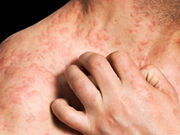Two-thirds of patients with CSU report angioedema, which significantly affects health-related QoL
WEDNESDAY, May 31, 2017 (HealthDay News) — Chronic spontaneous urticaria (CSU) interferes with sleep and daily activity, impairing work productivity, and patients frequently report angioedema, according to a study published online May 19 in Allergy.
Marcus Maurer, M.D., from the Charité-Universitätsmedizin Berlin, and colleagues conducted an international observational study involving a cohort of 673 adult patients with CSU whose symptoms persisted for at least 12 months despite treatment. The authors collected data on demographics, disease characteristics, and health care resources in the previous 12 months.
The researchers found that nearly half of the patients had moderate-to-severe disease activity, as reported by the Urticaria Activity Score. The mean Dermatology Life Quality Index score was 9.1 and the mean Chronic Urticaria Quality of Life Questionnaire score was 33.6. There was a marked interference for CSU with sleep and daily activities. Sixty-six percent of enrolled patients reported angioedema in the previous 12 months, which significantly affected health-related quality of life (HRQoL). One or more hour per week of missed work was reported by more than 20 percent of patients, with productivity impairment of 27 percent. There was an increase in these effects with greater disease activity. CSU treatment incurred significant health care resources and costs.
“CSU has considerable humanistic and economic impacts,” the authors write. “Patients with greater disease activity and with angioedema experience greater HRQoL impairments.”
The research was performed under a contract between RTI Health Solutions and Novartis Pharma; Novartis funded the study.
Copyright © 2017 HealthDay. All rights reserved.








